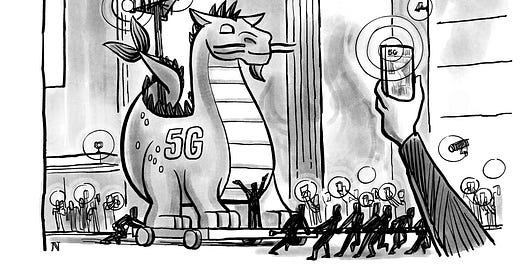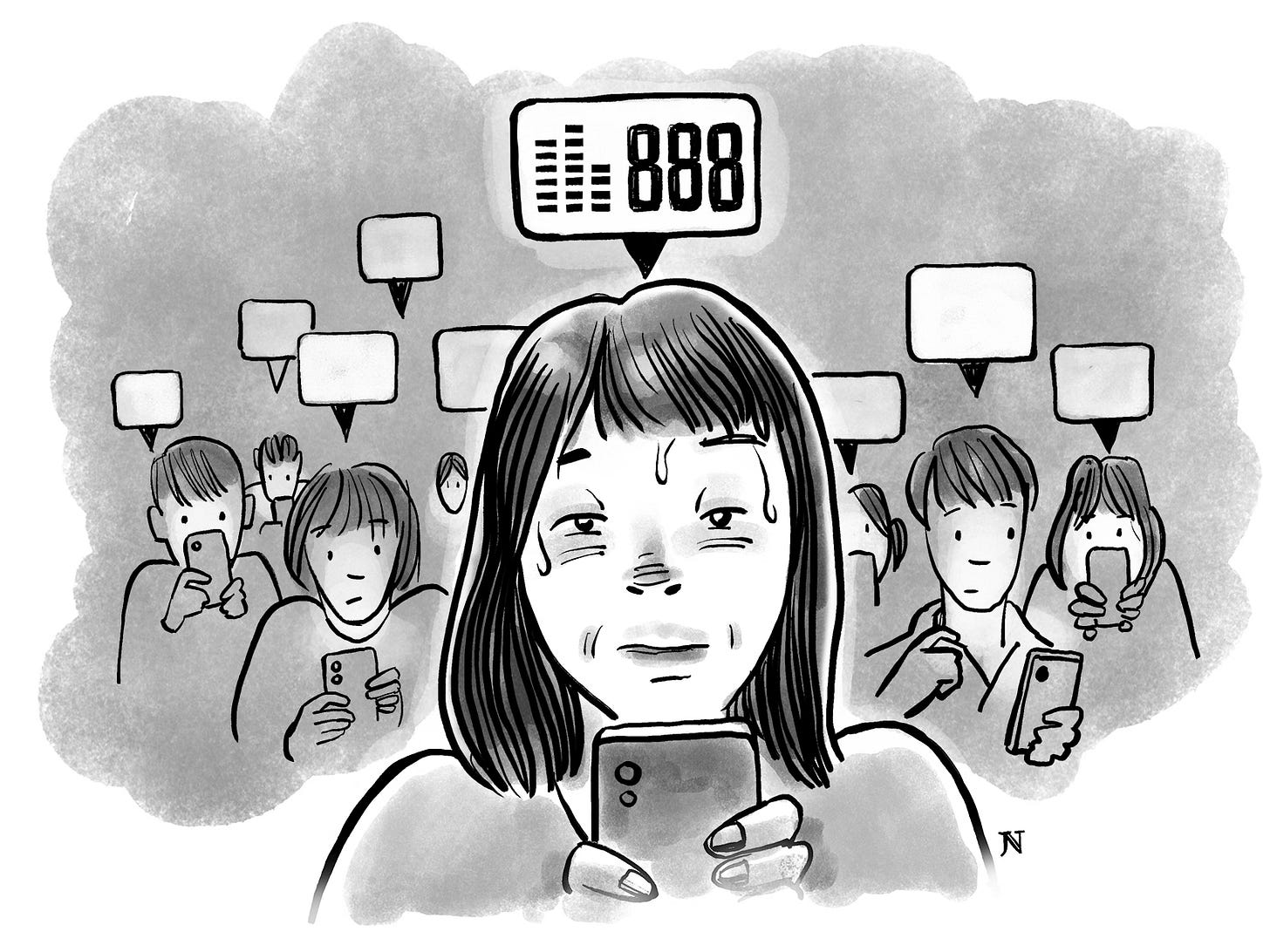A glimpse of China's Orwellian present/future
And what it tells us about the threat of Trump's return to power
British tech website The Register publishes a piece about the Chinese government using Hikvision, world’s biggest equipment supplier of video surveillance tech/hardware and emerging mover-and-shaker in the Internet of Things (IoT), to spy even more on Uigher Muslims in its far west, in this instance tracking whether or not Muslim students are eating at the university’s cafeterias during Ramadan. The premise is simple enough: anyone who gives off the evidence of fasting during that holy period is clearly a potential threat to the government.
Kind of reminds one of GOP anti-abortion extremists wanting to gain access to data from women’s menstrual-tracking apps, yes?
Here’s the key points from The Register’s story:
US-based research group IPVM has accused Chinese video surveillance equipment company Hikvision of engaging with a contract to develop technology that can identify Muslim students that are fasting during Ramadan, based on their dining records.
Hikvision used its LinkedIn page to confirm it had won a tender for the project, but denied its products can analyse video streams to identify ethnic minorities …
The $9 million contract required the first phase of a “Smart Campus” system be built out for Minjiang University in the Fujian province. The university celebrated the completion of the contract in December 2022.
Within the 600 page tender is the outline of a system called the "Assisted Analysis Of Ethnic Minority Students" which is intended to support administrators' "decision-making" and includes a feature that alerts administration to students suspected of fasting, according to IPVM.
In addition to knowing if a student is fasting, the Minjiang University smart campus project tracks and provides school management with extensive information on a person’s daily habits and life, according to the tender.
This includes details on book borrowing, holiday destinations, passport use, student club activities, information about family members and where individuals stand on their application for membership to the Chinese Communist Party.
In security terms, this is waaaaaaay “left of boom,” where “boom” is the act of defiance to be prevented (up to and including terrorism) and you (the government) want to access and influence that potential troublemaker well before he/she/they act (“left” or upstream of the event).
For those Terminator fans out there, a bit from my book America’s New Map:
An awkward legacy of Obama’s GWOT [Global War on Terror] makeover was his vigorous embrace of select killings of high-value targets—those enemies our government most wants dead. By doing so, America established precedents that competing great powers now readily exploit. Consider Putin’s targeted killings of Russian émigrés and defectors, Israel’s assassinations of senior Iranian government officials, and Saudi Arabia’s murdering of regime critics such as the journalist Jamal Khashoggi. China’s maximally preemptive targeting of its restive Muslim Uighurs elevates this approach to an industrial scale, to include forced abortions and sterilizations (per Terminator logic, there is no need to assassinate the rebel leader never born).
Spooky, right?
The larger argument is just as scary: governments seeking omniveillance (tracking everything about you right down to your eating, periods, smile on your face this morning …) not just to push-market you goods and services (like Google, Apple, MS, Amazon) but to push-punish your regarding any or all aspects of your daily life and private behavior deemed a threat to the government/stability/good citizenship/etc.
This is all about conditioning citizenry. From my book:
Advanced authoritarian governments like China increasingly grasp the potential for gamifying their citizens’ daily lives as a virtual means of totalitarian control. Chinese technology companies are required by law to share with the government everything they collect on citizens, enabling security agencies to calculate a “social credit score” that captures any activity or association deemed more or less acceptable by the Communist Party. Have a friend who openly criticizes the government? You lose points. Noticed searching “harmful” ideas online or geo-located at a street protest? You lose points. Conversely, like the right pro-government post? You gain points. Same for ending associations with “antisocial” people.
By design, point totals trigger real-world consequences. You try to buy that train ticket to Province X but are told your rating does not allow such travel. Your attempts to access a more exclusive housing complex are rebuffed without explanation. Meanwhile, you look around and realize that friends who toe the party line increasingly live in an entirely better universe than yours, going to places off-limits to you and engaging in activities beyond your grasp.
Pretty soon you find that you are self-correcting to raise your point total. Frowning in public is captured on face-recognition cameras, so you smile vaguely whenever outside your apartment. You avoid friends with lower scores.
You realize that your every movement, act, and even emotion is being held against you, determining the size of your virtual cage. The government no longer needs to actively control you—just remind you of your score. After some time, you are your own police, your own jail-keeper, your own minder. You have been gamified into complete submission within the Matrix.
That is the Chinese Communist Party’s definition of social harmony. You, as an American, might quite naturally recoil (actually, I would hope so!), but you can’t expect the same reaction around the world. When we’re talking about those hundreds of millions segueing into billions of new admittees into that majority global middle class, understand that their focus is protection from the future. They have their good life after centuries of abject poverty and they will sign up with ANYONE who will guarantee their continued class membership — along with their ability to successfully bequeath that status to their offspring.
The global majority middle class fears volatility, uncertainty, complexity, and ambiguity (VUCA) — the force horsemen of modern globalization. As a rule, they have little-to-no fear of classic state-on-state war or superpower strategic warfare. The former is exceedingly rare and the latter is far beyond their power to prevent — much less control. Their bogeyman is civil strife driving very up-close-and-personal VUCA dynamics. You take away their sense of stability — out of the blue, like Hamas just did to Israel, and they will freak out big time (Hamas’ clear goal). Same dynamic drove the US after 9/11.
But the thing is, democracies will only go so far to prevent such “vertical scenarios.” We understand there is a profound trade-off between that level of security (not defense, but security) and privacy, and that presumption of privacy is EXACTLY the veil the Chinese government hopes to pierce — quite stealthily — with systems like Hikvision’s Smart Campus or Huawei’s Smart City. In both instances the whole “smartness” angle is the government getting far more smarter about you.
The endgame is easy enough to imagine. From my book:
The danger here is Beijing’s successful commoditization of social intangibles like freedom and security, transforming them into generic products (like gasoline, flat-screen TVs, or budget air travel) undistinguishable by their source (democracies vs. autocracies). To a nervous global middle class seeking certainties in a seemingly uncertain world, China promotes the image that its freedom-and-security offering is not all that different from America’s—just cheaper, more reliable, and easier for emerging-market governments to implement and operate.
That is how democracy dies in the twenty-first century, not with a bang but with a bargain.
Let me be even more clear here about how this threat applies to the United States: When Trump trumpets the notion that America’s worst enemies are inside America versus outside, he’s selling that sort of invasive authoritarianism in his second term, during which he is promising to bring the full weight and power of the US Government down on anybody he considers to be a political enemy or potential downstream threat to his never-ending rule.
Trump doesn’t hide this ambition: he is laying it all out on the table in a manner that fits his own political approach of I-know-you-are-but-what-am-I? His whole spiel is to accuse his enemies of doing exactly what he is doing — thus justifying his “counter-punching” (that is nothing of the sort).
Trump has spent years selling his base that the US Government and the “deep state” are out to eliminate conservatives and destroy White America (I mean, whose “blood” exactly is being “poisoned” by non-White immigrants?). As Trump’s base now swallows that feat-threat reaction whole, their firm approval of his vision would allow him, in any return administration, to weaponize the government comprehensively so as to defeat that imagined “deep state” and make America safe for only his adherents while the rest of us would suffer a diminished citizenship through omniveillance-leading-to-systematic-persecution.
Trump is conditioning us to admire the Putins and Xis of the world because he wants to replicate their authoritarian playbook here in America. In a genuinely ironic manner, he is rendering true the very lie he propagates: right now Trump is a bigger threat to the future of America than the Chinese or Russians are.
And that is both profoundly wrong and dangerous for the world as a whole, because such a sidelined America is one destined for superpower failure and even bankruptcy, meaning China and Russia win.
Honestly, it’s hard to imagine Beijing or Moscow coming up with a better weapon than Trump right now when it comes to disabling their primary competitor — the United States.






